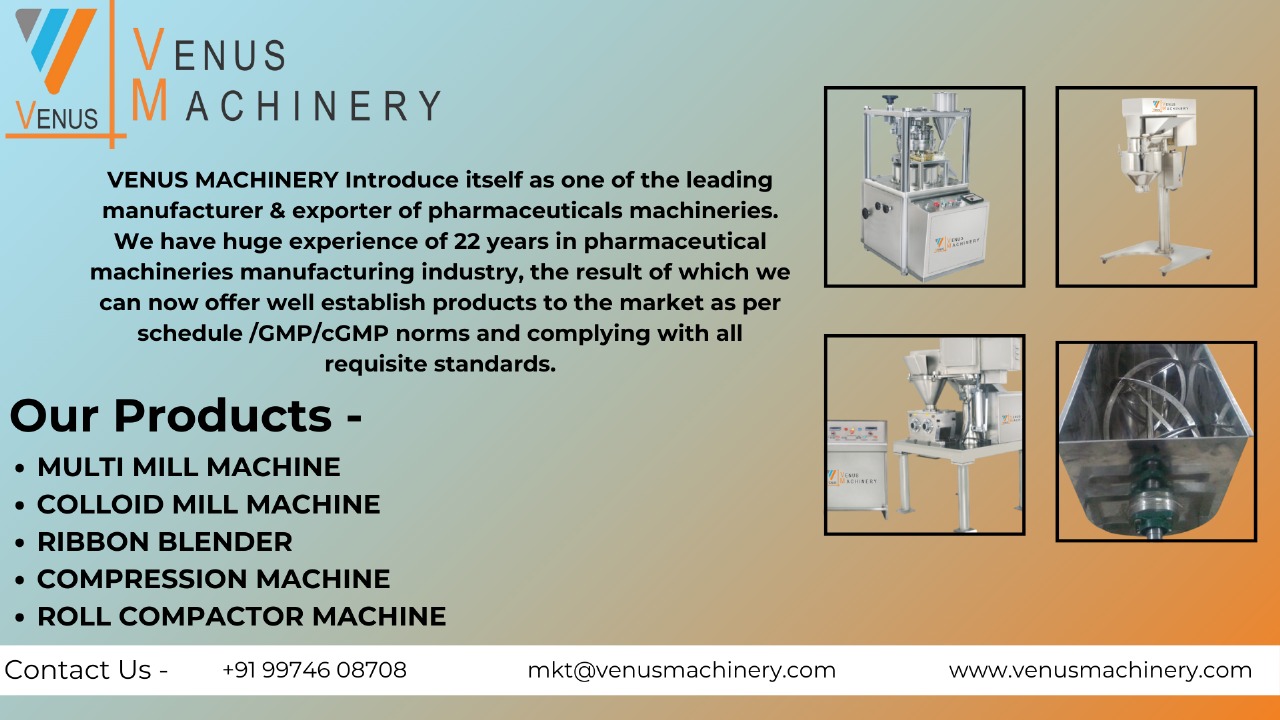Double Cone Blender Construction

Double Cone Blender Construction
DoubleCone Blenders are
widely used in the pharmaceutical, chemical, food, and cosmetic industries for
gentle and efficient mixing of dry powders and granules. The construction of a
double cone blender ensures uniform blending due to its unique design, which
enables multidirectional movement of the materials.
Applications:
- Pharmaceutical industry – Mixing dry powders,
granules for tablets and capsules.
- Food processing – Blending spices, dry ingredients,
additives.
- Chemical industry – Mixing various powders
and granular chemicals.
- Cosmetic production – Formulating face powders and talcum.
- Nutraceuticals – Mixing herbal and health
supplement powders.
Key Features:
- Stainless Steel Construction (SS 304/316)
- Two conical-shaped ends for gentle and thorough
mixing.
- Manual or motorized
operation
- CIP (Clean-In-Place) or
manual cleaning option
- Safety guard and
interlocking system
- Flanged ports for
loading/unloading
- Variable speed (optional)
- Custom volume capacities (5L to 5000L+)
Uses:
- Ideal for heat-sensitive and abrasive materials.
- Ensures uniform particle
distribution without high shear.
- Suitable for batch mixing
in R&D and production.
Benefits:
- Efficient blending with
minimal power.
- No cross-contamination due to smooth surface.
- Easy discharge and cleaning.
- Low maintenance and long operational life.
- Space-saving compact design.
FAQs – Double Cone Blender Construction
- What is a double cone
blender used for?
It is used for blending dry powders and granules uniformly. - What materials are used in
its construction?
Usually made from SS 304 or SS 316 stainless steel for hygiene and durability. - Is it suitable for wet
mixing?
No, it is designed specifically for dry material blending. - How does it achieve uniform
mixing?
The conical shape and slow tumbling motion promote multidirectional mixing. - What safety features are
included?
Interlocking safety guards, overload protection, and grounding. - Can I use it for small or
pilot-scale batches?
Yes, lab-size blenders (5-50L) are available for R&D. - How is material loaded and
discharged?
Through flanged ports or valves; discharge is often gravity-fed. - Does it require skilled
operation?
No, it's user-friendly and can be operated with basic training. - How long does blending take?
Typical mixing time ranges from 10 to 30 minutes, depending on the material. - Can I customize the blender
size and features?
Yes, most manufacturers offer tailored designs based on process requirements.
Contact us more detail :
Call - +91 99746 08708
Email - mkt@venusmachinery.com
Address : 29, Sarovar Industrial Estate,
Hathijan Circle, S.P. Ring Road, Vatva, Ahmedabad - 382445, INDIA
Our Blogs
- Fluid Bed Dryer Exporter from Ahmedabad
- SS Fluid Bed Dryer Manufacturer
- Fluid Bed Dryer for Pharma Industry
- GMP Fluid Bed Dryer Manufacturer in Ahmedabad
- Heavy-Duty Compression Machine Supplier in Gujarat
- Compression Machine for Concrete Testing in India
- Automatic Compression Testing Machine (CTM)
- Digital Compression Testing Machine
- Best Compression Testing Machine Supplier in India
- Top Compression Machine Manufacturer in Gujarat
- Compression Machine Exporters from Ahmedabad
- Compression Testing Machine Manufacturer in India
- Hydraulic Compression Machine Manufacturer in Ahmedabad
- Deburring and Dedusting Machine Manufacturer in India
- Lab Testing Compression Machine Ahmedabad
- Fluid Bed Dryer for Powder Drying in India
- Leading Compression Machine Manufacturer in Ahmedabad
- Top Fluid Bed Dryer Manufacturer in India
- Leading GMP Oscillating Granulator Machine Manufacturer
- Pharmaceutical Fluid Bed Dryer Manufacturer
- Stainless Steel Oscillating Granulator – Ahmedabad
- Fluidized Bed Dryer Supplier Gujarat
- Industrial Fluid Bed Dryer in Ahmedabad
- Oscillating Granulator for Pharma Industry
- Fluid Bed Processor Supplier in India
- SS Oscillating Granulator Exporter from Ahmedabad
- Fluid Bed Dryer Manufacturer in Ahmedabad
- Dust Extractor Machine Supplier
- Roll Compactor Manufacturers
- Ribbon Blender Manufacturer in Ahmedabad
- Electric Roll Compactor Machine Manufacturer in India
- Roller Compactor Machine for Pharmaceutical Industry
- Vibro Sifter Manufacturer in Mumbai
- Vibro Sifter Manufacturer in Ahmedabad
- Sintex Water Tank Manufacturer
- Vectus Water Tank Price 1000 Ltr
- 500 Litre Liquid Storage Tank Manufacturer
- Vibro Sifter Machine Manufacturer in India
- Liquid Storage Tank Manufacturer near Naroda, Ahmedabad
- Oscillating Granulator Machine Manufacturer
- Liquid Storage Tank Manufacturer near Ahmedabad, Gujarat
- Industrial Vibro Sifter Machine Manufacturer
- Horizontal Drive Manufacturer
- Vibro Sifter Working Principle
- Vibro Sifter Manufacturer in India
- Industrial Multi Mill Machine
- Multi Mill Machine Manufacturers
- Dust Extractor Machine Manufacturers
- Mass Mixer Machine Manufacturers
- Rapid Mixer Granulator (RMG) Sensors
- Double Cone Blender Manufacturers in India
- Colloid Mill Machine Manufacturers in Maharashtra
- Rapid Mixer Granulator (RMG) – Capacity Guide
- Colloid Mill Machine Manufacturers in India
- Rapid Mixer Granulator principal (RMG)
- Roll Compactor Machine Manufacturer in Ahmedabad
- Rapid Mixer Granulator (RMG)
- Industrial Roll Compactor Machine Manufacturer Solutions
- Roll Compactor Manufacturers in India
- Double Cone Blender Construction
- Small Roll Compactor Machine Manufacturer in India
- Roll Compactor Manufacturers in India
- Double Cone Blender – Pharmaceutical
- Double Cone Blender Manufacturer Near Me
- Ribbon Blender
- Cone Blender
- Octagonal Blender
- Camphor Machine
- Compression Machine
- Deburring and Dedusting Machine
- Tablet Machine
- Roll Compactor Machine
